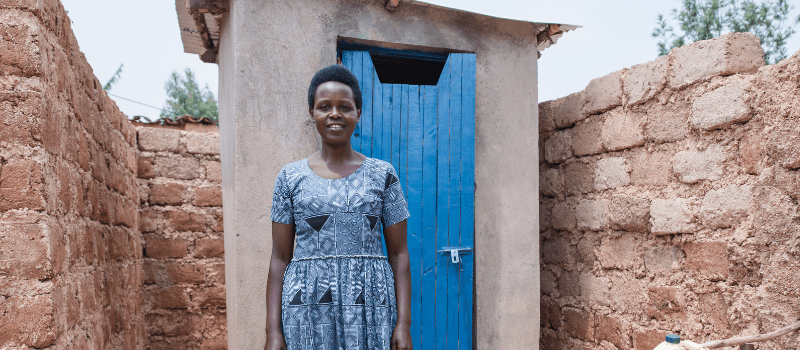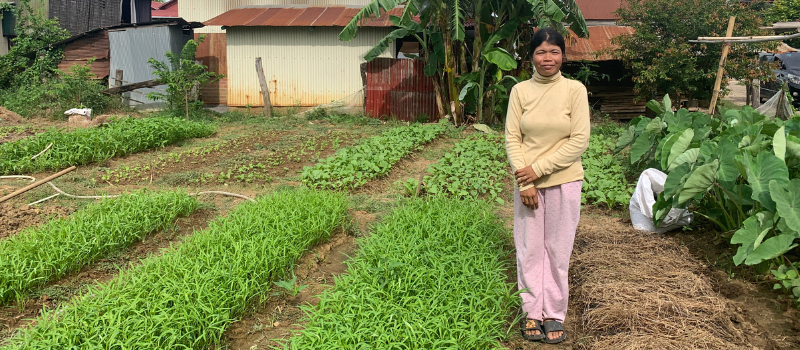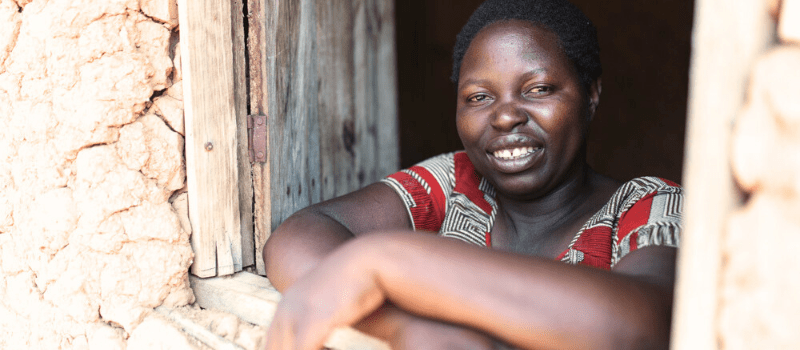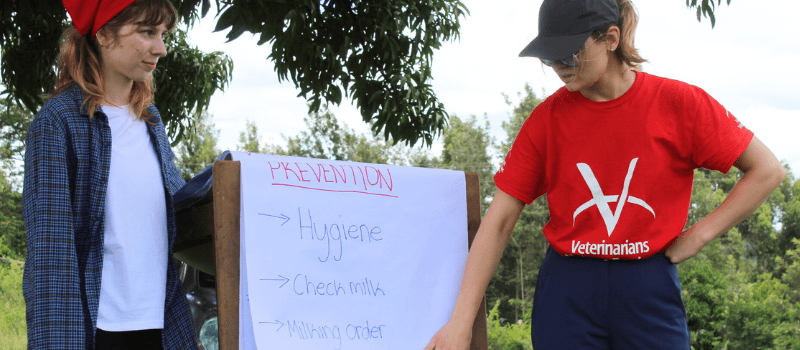This blog was written by Tanja Kisslinger, Director of Communications at VWB, in reflection of a trip to Rwanda in September 2025 to document our Community One Health Empowerment in Rwanda and Senegal (COHERS) program. Photos by Jess Holing for VWB.
A Life of Change
In Cyanika Sector, the morning air is cool and clear. Smoke rises from kitchen fires, children fetch water in yellow jerrycans, and the hillsides shimmer with green. For Josephine Mukagasana, a mother of five, mornings begin with sweeping the yard, cleaning the toilet, and washing dishes before heading to the fields. “We can’t teach others if our own homes are not clean,” she says.
For years, that was harder to do. Her family’s toilet was little more than an open pit—unsafe, unsanitary, and impossible to keep clean. “It was embarrassing,” she says. “The flies spread everywhere, and I worried my children would get sick.”
Today, she stands outside a new latrine—a structure built through the COHERS program—and smiles. “Now when one goes in, they feel comfortable. It’s clean, it’s safe, and my children understand why it's important.” But what she values most isn’t the concrete or the door. It’s what the toilet represents: knowledge, dignity, and change that begins at home.
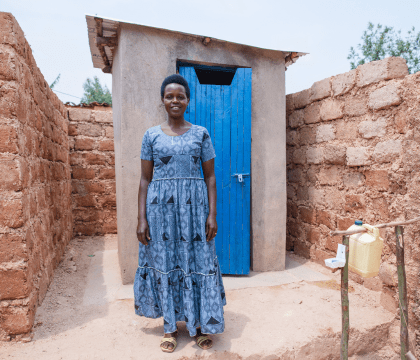 PHOTO: Josephine, the new latrine, and tippy-tap.
PHOTO: Josephine, the new latrine, and tippy-tap.
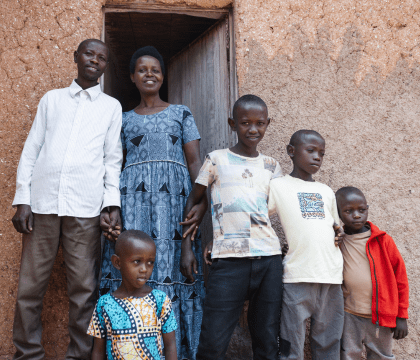 PHOTO: Josephine and family outside their home.
PHOTO: Josephine and family outside their home.
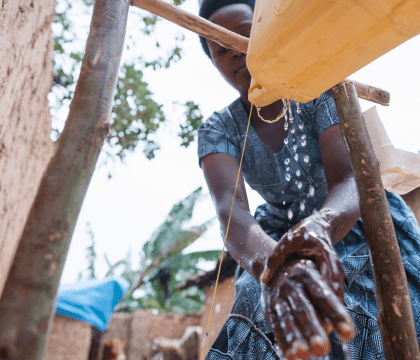 PHOTO: Josephine at her tippy-tap handwashing station.
PHOTO: Josephine at her tippy-tap handwashing station.
Bridging Health and Habit
Across Nyamagabe District, the COHERS program is bringing together veterinarians, community health workers, gender specialists, and WASH experts to stop Taenia solium—the pork tapeworm—from spreading between people, animals, and the environment. It’s a disease born of connection: free-roaming pigs that eat contaminated waste; open defecation that exposes families; and the quiet, cyclical suffering of households where sickness keeps returning.
Breaking that cycle takes more than one action. Deworming a child, vaccinating a pig, or building a latrine alone cannot solve it. Real prevention means changing behavior—turning hygiene into habit, and knowledge into confidence.
That’s where community leaders like Josephine come in.
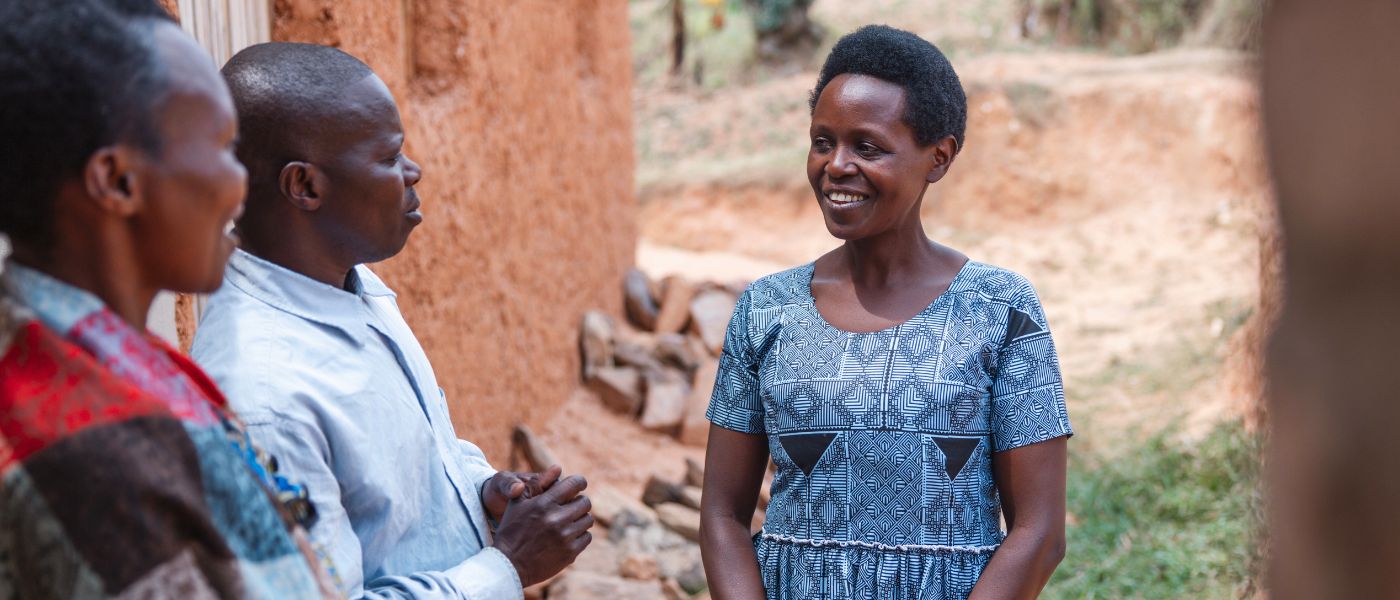 PHOTO: Josephine meeting with neighbors in her community who want to know more about the relationship between home hygiene and their animals.
PHOTO: Josephine meeting with neighbors in her community who want to know more about the relationship between home hygiene and their animals.
Learning Together, Leading by Example
Josephine is a member of her local Community Hygiene Club (CHC)—a dynamic group of men and women who meet each week to learn, demonstrate, and share lessons about hygiene, nutrition, and health.
“I joined because I saw the good things they were doing,” she says. “We help each other and teach each other about cooking, washing, and keeping our homes clean. If someone struggles, we visit them and help. We don’t judge—we show them how.”
At times during their monthly gatherings, CHC members sit in a circle, reviewing illustrated picture cards that show scenes of daily life. One by one, members explain what they see: a child washing hands, a woman preparing food near livestock, a family drawing water. If a scene shows poor hygiene, the group discusses how to improve it—what should change, and why. In this way, they practice how to speak with their neighbors about cleanliness, food safety, and disease prevention.
“It helps us learn how to teach others,” Josephine says. “When we talk about what we see, we understand it better ourselves.”
 PHOTO: Members of the Community Hygiene Club in Tare Sector discuss illustrated hygiene cards, identifying everyday risks and solutions as part of their skills building.
PHOTO: Members of the Community Hygiene Club in Tare Sector discuss illustrated hygiene cards, identifying everyday risks and solutions as part of their skills building.
Importantly, through COHERS, CHCs work hand in hand with One Health Teams (OHTs)—local volunteers like Louise Mukarugwiza who connect human and animal health. “They teach us about disease in animals, and we teach about cleanliness and hygiene,” Josephine explains. “Together, we prevent sickness before it starts.”
Understanding the Connections
What Josephine has learned through COHERS has reshaped how she sees her world. “We learned that everything is connected,” she says. “If your hands are dirty, you spread disease. If your pigs roam free, they eat dirt and get sick. If people go to the toilet in the open, it all comes back to us.”
That understanding is at the heart of One Health—the idea that the well-being of people, animals, and the environment are intertwined. In her own home, Josephine has put this knowledge into action: her pigs are penned, her family washes hands after every meal, and the latrine that once felt like a dream now stands as a daily reminder of what change looks like.
“When I clean, when I wash, I feel proud,” she says. “I know I’m keeping my family safe.”
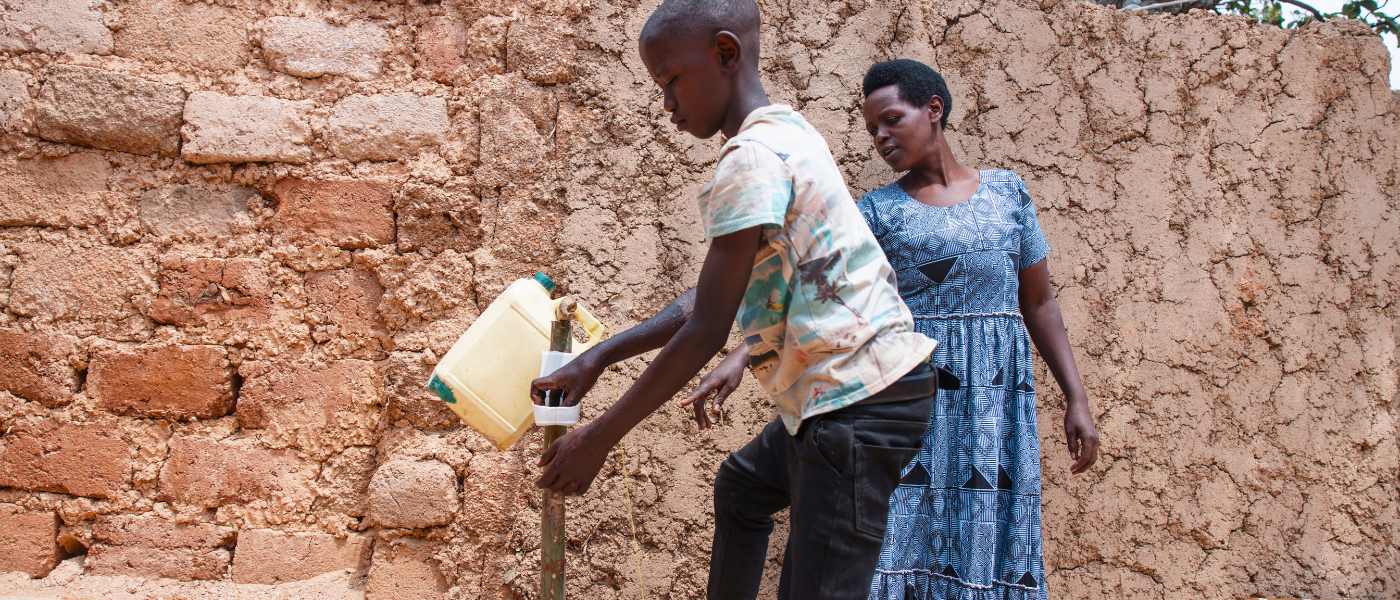 PHOTO: Josephine observes her son's use of the tippy tap installed beside their latrine—reminding her family daily of the power of handwashing to prevent disease.
PHOTO: Josephine observes her son's use of the tippy tap installed beside their latrine—reminding her family daily of the power of handwashing to prevent disease.
A Door to Dignity
Josephine’s family was one of 1,000 selected for household latrine construction across Cyanika, Tare, and Kibumbwe sectors. To date, 700 latrines have been completed—serving more than 4,000 people. But the true impact lies in what happens next. “People used to think sickness just happens,” Josephine says. “Now we know that many diseases come from things we can control.”
And neighbors have started asking about her toilet, eager to learn how they can build their own. “I tell them it helps people avoid diseases caused by poor hygiene, both for children and adults,” she says. “When people see it and understand it, they want to change too.”
Building a Handwashing Culture
Across Nyamagabe District, a growing number of CHCs like Josephine’s are fostering what local leaders call a "handwashing culture"—a movement of cooperation and care. Each club represents dozens of households, meeting regularly to refresh knowledge, share experiences, and plan outreach. Together with OHTs, they’ve helped families install tippy taps, improve latrines, and separate animal pens from kitchens—small actions that add up to systemic change.
“It’s more than a toilet,” Josephine says. “It’s privacy, dignity, and safety. It means our children grow up healthy. It means we understand how to keep ourselves and our animals safe.”
When she speaks, it’s clear that Josephine's pride is not only in what she’s received, but in what she’s become—a teacher, a neighbor, and a leader in her community’s health.
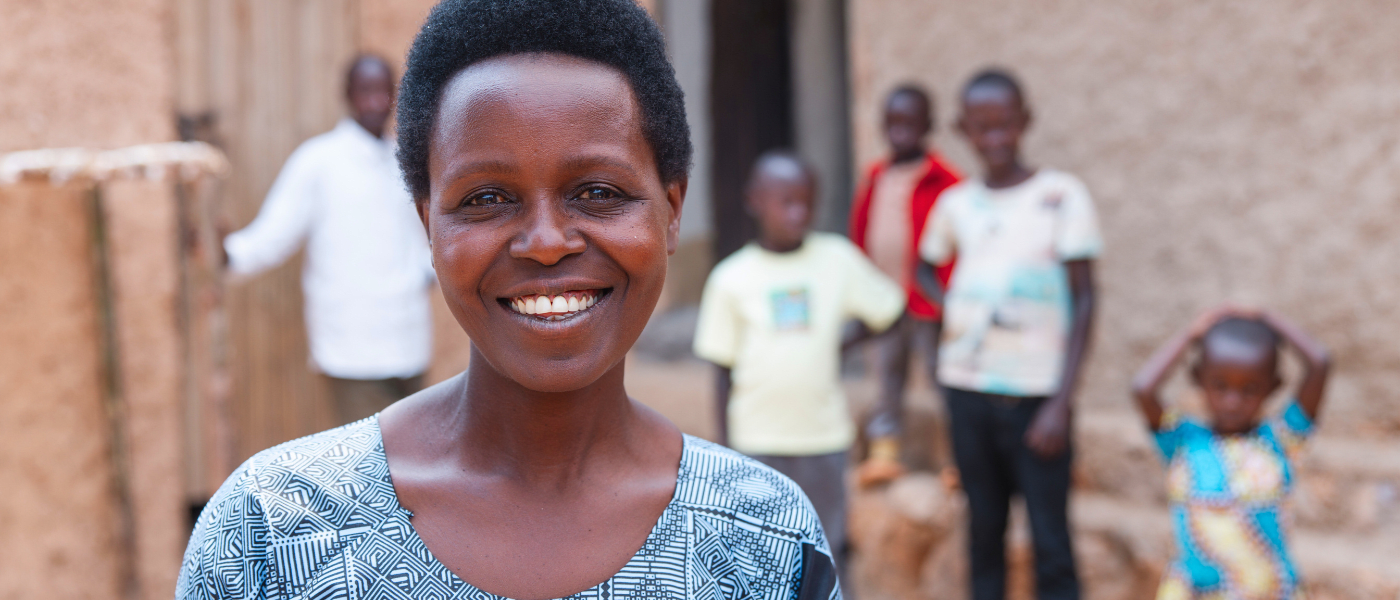 PHOTO: Josephine smiles—empowered by the knowledge that, as a COHERS CHC member, she is helping open new doors to dignity and health for her family and community.
PHOTO: Josephine smiles—empowered by the knowledge that, as a COHERS CHC member, she is helping open new doors to dignity and health for her family and community.
COHERS is a four-year initiative (2023–2027) that strengthens community health systems to prevent zoonotic diseases in Rwanda and Senegal by uniting human, animal, and environmental health. Funded by Global Affairs Canada and led by VWB, COHERS is delivered with local and international partners including the University of Global Health Equity, WaterAid Rwanda, the University of Guelph, the Institute of Health Economics, and Agronomes et Vétérinaires Sans Frontières. Learn more.

